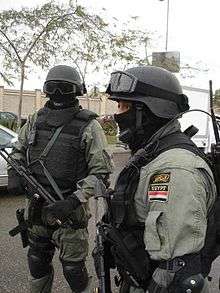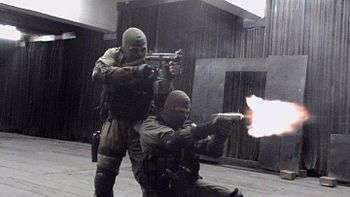Unit 777
| Unit 777 Combat | |
|---|---|
| الوحدة 777 قتال | |
|
The Egyptian Unit 777 | |
| Active | 1978 – present |
| Country |
|
| Allegiance | Military of Egypt |
| Branch | Egyptian Army |
| Type | Special Operations Forces |
| Role |
Special operations Counter Terrorism |
| Size | Classified |
| Part of | Thunderbolt |
| Garrison/HQ | Southern Cairo |
| Mascot(s) | The Eagle of Thunderbolt |
| Engagements |
EgyptAir Flight 321 EgyptAir Flight 648 Larnaca International Airport Raid Operation Eagle |
| Commanders | |
| Current commander | Classified |
| Aircraft flown | |
| Helicopter |
Westland Sea King Commando Sikorsky UH-60 Black Hawk Mil Mi-8 CH-47 Chinook |
Unit 777 (Arabic: الوحدة 777 قتال), also known as Task Force 777, is an Egyptian military counter-terrorism and special operations unit. It was created in 1978[1] by the government of Anwar Sadat in response to concerns of increased terrorist activity following the expulsion of Soviet military advisors from the country by Sadat and his efforts to achieve peace with Israel.[1]
Creation
In 1978, Egyptian Army Special Forces were dispatched to Larnaca International Airport, Larnaca, Cyprus in response to the hijacking of a Cyprus Air passenger aircraft by operatives of the Popular Front for the Liberation of Palestine (PFLP). The operation was organized hastily, and Egyptian authorities failed to notify Cyprus of the arrival of the unit. As the Egyptian commandos approached the plane on the tarmac, they were mistaken by the Cyprus security forces as terrorist reinforcements. Cypriot security forces opened fire on the approaching Egyptian SF members, who were without nearby cover and conspicuous in desert camouflage clothing. The firefight cost the lives of 15 members of the 79 members of the Egyptian commando force sent, however there were no reported Cypriot fatalities.[1] The aftermath of the failed night-time incident and the need of a professional counter-terrorism unit in Egypt resulted in the creation of Unit 777.
EgyptAir Flight 321

On August 23rd, 1976, three armed terrorists claiming to be from the Abd Al-Nasir Movement hijacked the EgyptAir Flight 321, a Cairo-Luxor flight, and asked the pilot to land in Tripoli. One of the three hijackers was a 21-year-old Palestinian, Mohammed Naguid, who was working in Kuwait.[2] They demanded the release of five Libyans imprisoned in Cairo in connection with two assassination attempts.[3] The context was the deterioration of relations between Egypt and Libya after the Yom Kippur War due to Libyan opposition to Sadat's peace policy. There had been a breakdown in unification talks between the two governments, which subsequently led to the Libyan-Egyptian War. Fifteen minutes after takeoff from Cairo International Airport, an Italian pilot called the airport to report that he had received a beam aerial from the Egyptian aircraft heading to Luxor that it had been hijacked and the flight was under terrorist control.
President Sadat ordered the Prime Minister and the Minister of Defense to make the necessary decisions to protect the passengers and arrest the terrorists. The Prime Minister and the Minister of Defense quickly flew to Luxor International Airport where they started a secret meeting in the airport's tower, while Major General Abdul Hafiz Al-Bagori, Governor of Qena started negotiations with the three terrorists in order to gain time. During a call between the cockpit and the airport, the pilot complained about a problem in the aircraft - that it had not shown that the aircraft needing refuelling - and that the aircraft needed maintenance. The terrorists were persuaded to allow the aircraft to land in Luxor for refuelling. Negotiations continued until 3 p.m., when the governor told the terrorists that engineers were ready. The engineers were two disguised Sa'ka officers, who went inside and outside the aircraft several times in order to appear to be maintenance workers. Minutes later three officers stormed the aircraft and captured the hijackers.
The force that stormed the aircraft was later announced to be a special unit within the Sa'ka force and further information was classified, the same force which was later named 777.
EgyptAir Flight 648, 1985
In 1985, Unit 777 was dispatched again to deal with a hijacking, this time to Malta. An Egypt Air Boeing 737 (EgyptAir Flight 648) had landed in Luqa Airport under the control of Abu Nidal faction terrorists, purportedly as retaliation for Egypt's failure to protect the terrorists that had hijacked the MS Achille Lauro earlier that year. 11 hostages were released, but at least one Israeli woman was murdered.[4] Although the operation was planned more carefully this time, the TF 777 operators committed several mistakes that would eventually prove fatal to many of the hostages.[5] As explosives were detonated to attempt to blow a hole on the top of the airframe, the explosion ripped through the cabin area, immediately killing 20 passengers.[6] Using the same hole, the operators gained entry to the plane but in the confusion opened fire indiscriminately and killed and injured more passengers. In the ensuing chaos, passengers that managed to flee the plane were then gunned down by snipers in positions around the airport who mistook them for terrorists attempting to escape. The total number of passengers killed was 57, out of 88 total.[7]
Op-Global Sky
|
|
On June 3, 1998, in response to the departure the ship Global Sky from Suez without paying port fees it owed, the Suez Canal Authority asked the Egyptian Armed Forces to intervene. The Egyptian Armed Forces decided to send Unit 777 along with naval forces to deal with the ship in international waters. Unit 777 used a Commando helicopter to descend on the main deck, capturing the whole crew without damaging the vessel.
Current status
After the outcomes of their first two major operations, Unit 777 was temporarily disbanded, and formed again later to deal with internal threats. The unit is currently located in southern Cairo and is equipped with Mi-8 helicopters. The unit actively trains with a number of Western special operations groups, including the United States Army's Delta Force, United States Navy's SEAL Team Six, and the French GIGN.[7]
Firearms
-
 Germany: Heckler & Koch MP5
Germany: Heckler & Koch MP5 -
 Germany: Heckler & Koch MP7
Germany: Heckler & Koch MP7 -
 Germany: Heckler & Koch G36
Germany: Heckler & Koch G36 -
 USA: M1911 pistol
USA: M1911 pistol -
 Soviet Union/
Soviet Union/ Egypt: AKM - Locally made Misr rifle
Egypt: AKM - Locally made Misr rifle -
 Switzerland: SIG SG 550
Switzerland: SIG SG 550
See also
- Hatem Saber
- EgyptAir Flight 648
- Egyptian raid on Larnaca International Airport
- Egyptian Sinai war on terror
Notes
- 1 2 3 Ryan, p.22
- ↑ Mickolus, Edward F. (2009). The Terrorist List. ABC-CLIO.
- ↑ "Terrorist Skyjackings: A CIA Report". scribd.com. Retrieved 2 June 2015.
- ↑ "BBC On This Day 1985: Commandoes storm hijacked plane". BBC News. 1985-11-24. Retrieved 2009-02-08.
- ↑ "Anniversary of a massacre - The EgyptAir hijack in Malta". Times of Malta. 23 November 2010. Retrieved 2 June 2015.
- ↑ Some sources claim that the terrorists hurled grenades, causing many of the deaths.
- 1 2 Ryan, p.23
References
- Ryan, Mann and Stillwell (2003). The Encyclopedia of the World's Special Forces. ISBN 0-7607-3939-0
